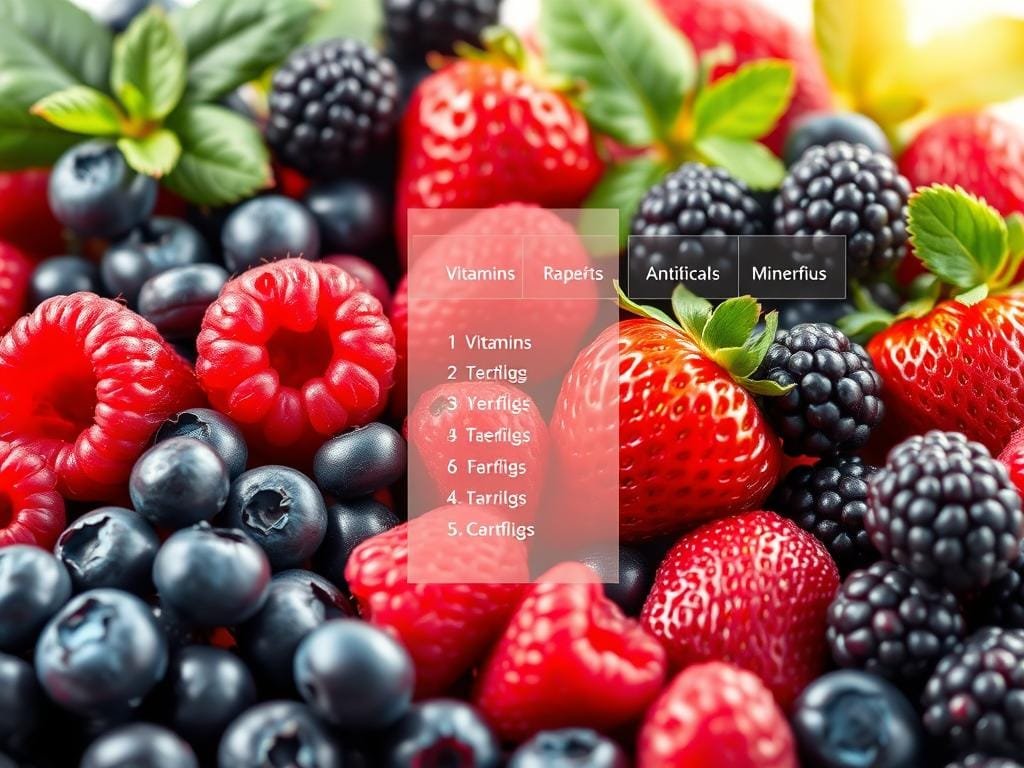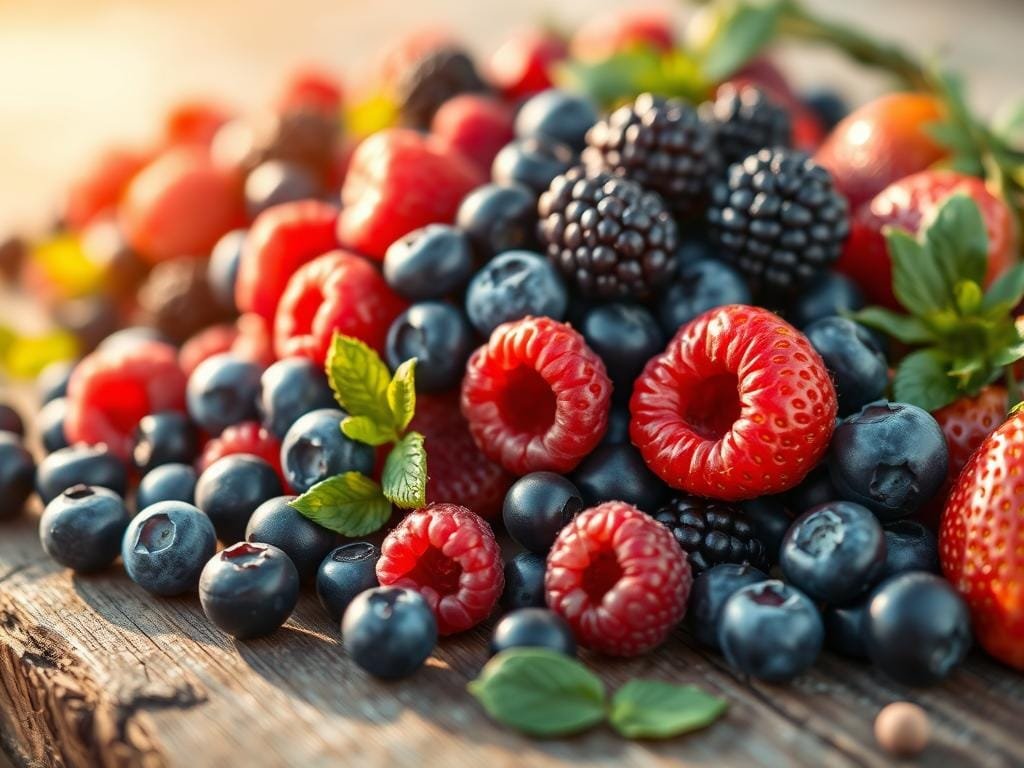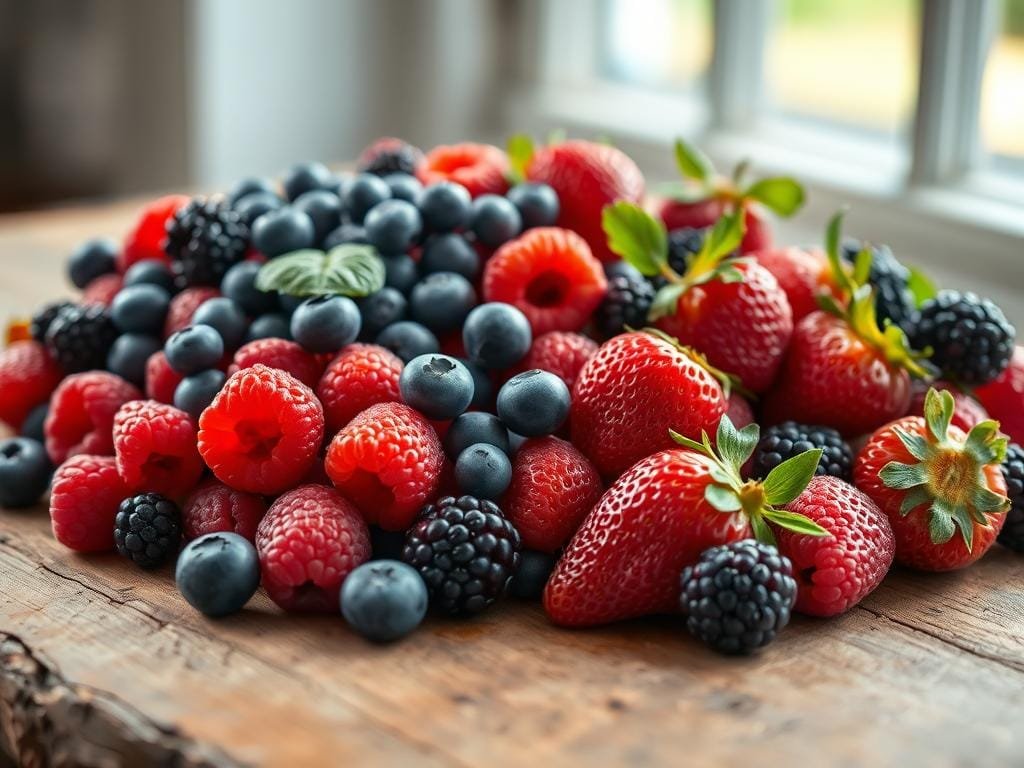Have you heard that some foods can make you live longer and healthier? Antioxidant-rich foods are known to boost health. Berries are a standout for their high antioxidant levels.
Eating antioxidant-rich superfoods like berries can lead to many health perks. Studies show that berry lovers might live longer. This is because berries are packed with flavonoids, like anthocyanidins.
Table of Contents
Key Takeaways
- Berries are rich in antioxidants and linked to various health benefits.
- Regular consumption of berries is associated with a lower risk of mortality.
- Flavonoids, particular anthocyanidins, in berries contribute to their health benefits.
- A higher intake of antioxidant-rich foods like berries may support longevity.
- Incorporating berries into your diet can be a simple way to boost overall health.
What Are Berries and Why Are They Important?
Berries are more than just a tasty addition to meals; they are a powerhouse of vitamins, minerals, and antioxidants. These small, fleshy fruits have been a cornerstone in human diets for centuries. They provide not only flavor but also numerous health benefits.

Definition and Classification of Berries
Berries are fruits with three distinct fleshy layers: the exocarp, mesocarp, and endocarp. They are typically small, sweet or tart, and come in a variety of colors. Examples include blueberries, strawberries, raspberries, and blackberries.
While many fruits are called berries, not all fit the botanical definition.
Nutritional Profile of Berries
Berries are renowned for their high nutritional value. They are rich in vitamins C and K, potassium, and antioxidants. The antioxidant capacity of berries is noteworthy, with fruits like blueberries and cranberries leading the pack.
This makes berries an excellent choice for those looking to incorporate healthier options into their diet.
A study published in a leading nutrition journal found that berries are a rich source of antioxidants. They have been associated with various health benefits, including reduced inflammation and improved cardiovascular health. This highlights the significance of berries in a balanced diet.
The Evolutionary Role of Berries in Diet
Berries have played a key role in the human diet throughout history. They are a convenient, nutritious food source that can be easily foraged or cultivated. The evolutionary adaptation of humans to consume berries has contributed to their widespread inclusion in diets across different cultures.
Berries are not only a source of essential nutrients but also provide dietary fiber, which is vital for digestive health.
Incorporating fresh berries into your diet can be as simple as adding them to your breakfast cereal, blending them into a smoothie, or enjoying them as a snack. With their rich nutritional profile and versatility, it’s no wonder that berries have become a staple in many cuisines around the world.
The Health Benefits of Berries
Berries are packed with health benefits. They boost your immune system and help your heart. They are full of antioxidants, vitamins, and minerals that keep you healthy.
Boosting Immune Function
Berries are great for your immune system. They have lots of vitamin C and antioxidants. Vitamin C helps make white blood cells, which fight infections.
For example, strawberries are full of vitamin C. One serving gives you more than 100% of what you need every day.
- Blueberries contain anthocyanins, which have been shown to have immunomodulatory effects.
- Raspberries are rich in ellagic acid, which has been found to have anti-inflammatory properties.
Reducing Inflammation
Chronic inflammation can lead to many diseases. Berries can help reduce this inflammation. They are full of antioxidants that fight off free radicals.
“The antioxidant capacity of berries is one of the highest among all fruits and vegetables, making them an excellent addition to an anti-inflammatory diet.”
Supporting Heart Health
Berries are good for your heart. They improve your heart’s function and lower the risk of heart disease. The fiber, vitamins, and minerals in berries are all heart-healthy.
Blueberries have been shown to lower blood pressure and improve lipid profiles.
Eating different types of berries can greatly benefit your health. It supports your overall well-being.
Antioxidants: The Key to Berry Benefits
Antioxidants are key players in our health, and berries are packed with them. They help protect our cells from damage caused by free radicals.
What Are Antioxidants?
Antioxidants fight off cell damage from free radicals. Free radicals are unstable molecules that our bodies produce. Antioxidants act like “free-radical scavengers,” protecting our cells.
Key antioxidants include vitamins C and E, selenium, and beta-carotene. Berries are full of vitamin C and anthocyanins. These powerful antioxidants offer many health benefits.
How Antioxidants in Berries Work
Berries’ antioxidants neutralize free radicals, reducing oxidative stress. Oxidative stress is linked to diseases like heart disease and cancer. Eating berries can help lower this stress.
“The antioxidant capacity of berries is one of the highest among all fruits and vegetables, making them an excellent dietary choice for those looking to boost their antioxidant intake.”
Berries get their antioxidant power from anthocyanins and ellagic acid. These compounds have anti-inflammatory effects.
Comparison with Other Foods
While berries are great for antioxidants, other foods are too. Here’s a look at how berries compare with other antioxidant-rich foods:
| Food | Antioxidant Capacity (ORAC value per serving) |
|---|---|
| Blueberries (1 cup) | 9,621 |
| Strawberries (1 cup) | 4,038 |
| Raspberries (1 cup) | 4,882 |
| Pecans (1 ounce) | 17,075 |
| Spinach (1 cup cooked) | 840 |
The table shows berries have high antioxidant capacity, but pecans have even more. Yet, berries are a favorite for boosting antioxidants.

Eating a mix of antioxidant-rich foods, like berries, helps fight oxidative stress. This can protect against chronic diseases.
Popular Types of Berries and Their Benefits
Berries are not just tasty; they’re also full of nutrients. Each berry type has its own special health benefits.
Blueberries: The Brain-Boosting Berry
Blueberries are famous for boosting brain power. They’re loaded with antioxidants. Eating blueberries might help keep your mind sharp as you age.
- Rich in antioxidants
- Improves memory and cognitive function
- May help in reducing the risk of age-related cognitive decline
Strawberries: A Heart-Friendly Choice
Strawberries are full of vitamin C and potassium. They’re good for your heart. Eating strawberries can help lower blood pressure and cholesterol.
- High in vitamin C and potassium
- Helps in lowering blood pressure
- Reduces the risk of heart disease
Raspberries: High Fiber and Low Calorie
Raspberries are high in fiber and low in calories. They’re perfect for those watching their weight. Raspberries also have manganese, which is good for bones.
- High in dietary fiber
- Low in calories
- Rich in manganese for bone health

Eating different types of berries can improve your health in many ways. They can boost brain function, support heart health, and help with weight management. Berries are versatile and can be enjoyed fresh, frozen, or dried.
How to Incorporate Berries into Your Diet
Adding berries to your meals boosts your antioxidant intake. They’re versatile and fit into many dishes, from breakfast to dessert.
Delicious Smoothie Recipes
Smoothies are a great way to enjoy berries. Mix your favorite berries with yogurt, milk, or a milk alternative. Add honey for sweetness. You can also add spinach or protein powder for extra nutrition.
Here’s a simple recipe to get you started:
- 1 cup frozen mixed berries
- 1/2 cup Greek yogurt
- 1/2 cup almond milk
- 1 tablespoon honey
- 1 handful of spinach (optional)
Blend until smooth and enjoy as a healthy breakfast or snack.
Creative Salad Ideas
Berries add flavor and color to salads. Try a mix of mixed greens, strawberries, feta cheese, and balsamic vinaigrette for a refreshing salad. Or, mix blueberries with spinach, walnuts, and citrus vinaigrette for a nutritious lunch.
Here’s a simple salad recipe:
| Ingredient | Quantity |
|---|---|
| Mixed greens | 2 cups |
| Sliced strawberries | 1 cup |
| Feta cheese | 1/2 cup |
| Balsamic vinaigrette | 2 tablespoons |
Snacks and Desserts Featuring Berries
Berries are perfect for snacking and desserts. Make a berry parfait with Greek yogurt, granola, and your favorite berries. Or, bake a berry crisp with fresh or frozen berries, oats, and cinnamon.

For a quick snack, mix berries with nuts and dark chocolate for a healthy treat.
The Role of Berries in Disease Prevention
Berries are not just tasty; they’re also full of nutrients that fight diseases. They play a big role in preventing chronic conditions. This is why berries are getting more attention for their health benefits.

Cancer-Fighting Properties
Berries are loaded with antioxidants and phytochemicals. These compounds have cancer-fighting properties. Eating berries may lower the risk of some cancers by protecting cells and stopping tumors from growing.
A study in the National Center for Biotechnology Information shows berries’ anti-cancer effects. Ellagic acid in strawberries and raspberries is key. It kills cancer cells by inducing apoptosis.
“Berries are great for a diet that fights cancer,” says recent research. Their antioxidants and anti-inflammatory properties are key.
Berries and Diabetes Management
Berries also help with diabetes management. They have fiber and antioxidants that control blood sugar and improve insulin use. Eating berries can help manage type 2 diabetes.
A study found that berry anthocyanins reduce inflammation and oxidative stress. These are big factors in diabetes complications.
Promoting Healthy Aging
Berries also support healthy aging. Their antioxidants fight oxidative stress and inflammation. These are major aging factors. Eating berries regularly helps keep your mind and body healthy as you age.
Berries are a key part of a healthy diet. They support overall well-being and may even help you live longer. “Eating different berries every day is a simple way to boost your health,” say nutrition experts.
Buying and Storing Berries
To get the most from berries, knowing how to buy and store them is key. Whether you choose fresh or frozen, how you store them impacts their freshness and nutrition.
Choosing Fresh vs. Frozen Berries
Fresh and frozen berries both offer nutritional benefits. Fresh berries are best eaten right away for their texture. Frozen berries are perfect for all-year use and are often frozen at their peak, keeping nutrients intact.
- Fresh Berries: Choose berries with bright color, plumpness, and a sweet smell. Steer clear of moldy, crushed, or leaking berries.
- Frozen Berries: Go for IQF (individually quick frozen) berries to avoid clumps. Check for any damage or freezer burn on the packaging.
Best Practices for Storage
Storing berries right is essential for keeping them fresh. For fresh berries, store them in a cool, dry spot or the fridge.
- Don’t wash fresh berries before storing; extra moisture can cause mold.
- Use a breathable container, like the original packaging or a mesh bag, to store them.
- To freeze fresh berries, spread them on a baking sheet, then put them in airtight containers or bags.
How to Prepare Berries for Consumption
Correct preparation can boost berries’ taste and nutrition. Rinse fresh berries gently just before eating, and dry them off.
- For Salads and Snacks: Enjoy berries raw for a sweet touch in salads or as a healthy snack.
- For Cooking and Baking: Use berries in various recipes, from jams to baked goods and smoothies.
By following these tips for buying, storing, and preparing berries, you can enjoy their health benefits and taste all year.
Berry Supplements: Are They Worth It?
Berry supplements are seen as a quick way to get the health benefits of berries. With more people looking for dietary supplements, it’s key to check if they work and are safe.
Overview of Berry Supplements
Berry supplements are made from berry extracts or powders. They’re marketed as easy to use, giving you berry nutrients without eating them. You can find them in capsules, tablets, or powders.
Potential Benefits of Supplements
People think berry supplements have many benefits, including:
- Convenience: They offer a concentrated dose of berry nutrients in an easy form.
- Antioxidant support: Berries are full of antioxidants, and supplements can boost your intake.
- Cardiovascular health: Some studies show they might help your heart by reducing inflammation and improving blood fats. For more on berries and heart health, check out Hopkins Medicine.
Risks and Considerations
But, there are also risks and things to think about:
| Risk | Description |
|---|---|
| Quality variability | The quality of berry supplements can vary a lot between makers. Some might have contaminants or wrong labels. |
| Regulatory oversight | Berry supplements aren’t as closely watched as medicines. This can mean different quality and effectiveness. |
| Interaction with medications | Berry supplements might affect how some medicines work, like blood thinners. Use them carefully. |
In summary, berry supplements might be a handy way to get berry nutrients. But, it’s important to be careful. Knowing the good and bad can help you decide if they’re good for you.
The Future of Berries in Nutrition
The future of nutrition is being shaped by berries. They are versatile and packed with nutrients. As research finds more benefits, they’re becoming key in our diets.
Emerging Research on Berries
Studies are digging deeper into berries and their health benefits. Functional foods made with berries are getting attention for their health perks.
Recent studies show berries may help keep our minds sharp as we age. They might even lower the risk of age-related cognitive decline.
The Role of Berries in Functional Foods
Berries are being added to functional foods for their nutritional value. They’re in everything from drinks to snack bars and cereals. This makes these products healthier and more appealing to those looking for better options.
Adding berries to your diet through functional foods can be a nutritional boost. Look for products that feature berries as a main ingredient.
Sustainability in Berry Farming
The demand for berries is rising, making sustainable farming more critical. Berry farming can harm the environment, but many farmers are changing. They’re using less water, fewer pesticides, and rotating crops.
Supporting sustainable berry farming helps the environment and ensures berries will be around for the future.
Common Myths About Berries
Despite their popularity, berries are often misunderstood. Many people think they are too sugary or that organic is always better. But the truth is different.
Debunking Nutritional Misconceptions
One myth is that berries are too sugary. But berries have fiber too, which helps control sugar digestion. For example, strawberries have 7 grams of sugar and lots of fiber and antioxidants.
Berries are packed with vitamins, minerals, and antioxidants. They are also low in calories, making them great for weight management. Learn more about berries and other fruits at Prevention.com.
Understanding Sugar Content
People worry about berry sugar content. But berry sugar is natural and comes with fiber, water, and phytochemicals. These work together to keep you full and satisfied.
- Berries are rich in antioxidants and fiber.
- The natural sugars in berries are balanced by their fiber content.
- Choosing a variety of berries can help maximize their nutritional benefits.
The Truth About Organic vs. Conventional
The debate on organic vs. conventional berries often focuses on pesticides. Organic berries may have less pesticide, but the difference is not always big. Choosing local or sustainable berries can be more important than organic or conventional.
By understanding berries, you can make better choices for your diet. Debunking myths lets you enjoy berries’ many health benefits.
Conclusion: Embracing Berries for a Healthier Life
Berries are packed with nutrients that can boost your health and help you live longer. They are full of antioxidants, which fight off diseases. Eating berries can also improve your immune system and heart health.
Key Takeaways
Berries are great because they’re full of antioxidants. They can help you age healthily and prevent diseases. Knowing this, you can add berries to your meals easily.
Incorporating Berries into Your Life
You can add berries to many foods, like smoothies, salads, snacks, and desserts. Eating berries regularly can make you healthier and help you live longer.
By making berries a part of your diet, you’ll see big benefits for your health. You’ll be on your way to a healthier, more vibrant life.

